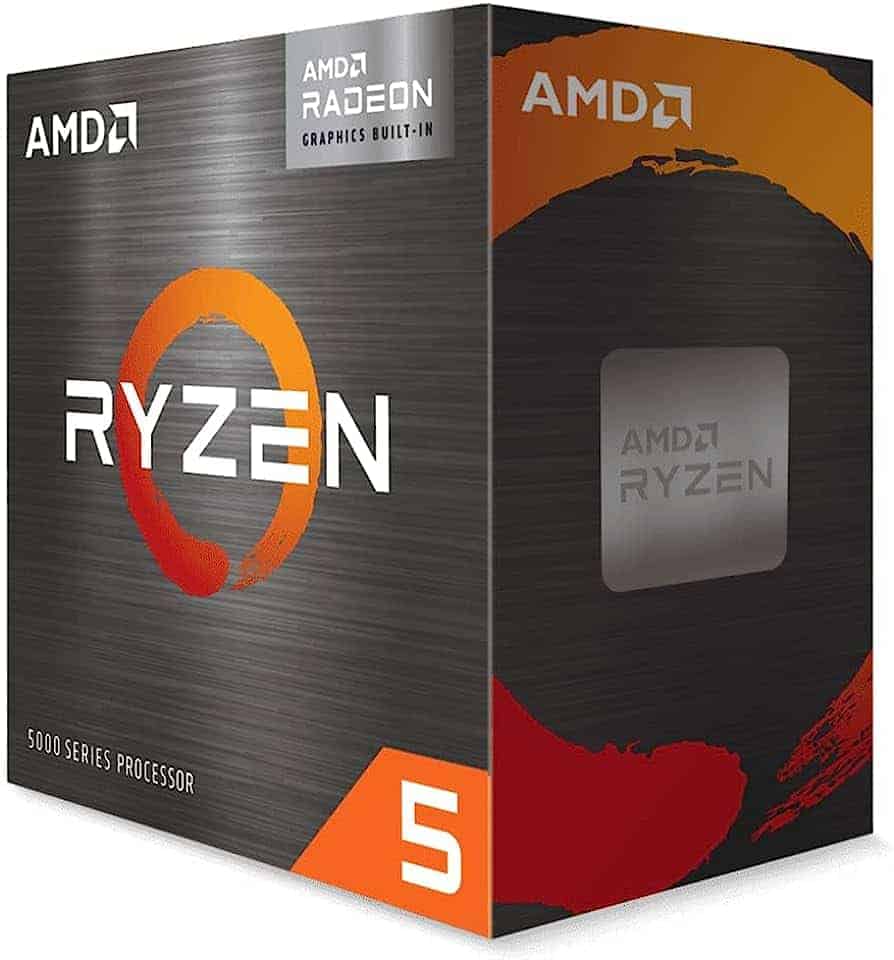AMD’s Ryzen 5000 Series processors bring a new level of performance to desktop computing. These CPUs, based on the Zen 3 architecture, offer significant improvements over their predecessors. The Ryzen 5000 Series provides up to 19% more instructions per clock (IPC) than the previous generation, resulting in faster processing speeds for various tasks.
Gaming enthusiasts and content creators will find these processors particularly appealing. The Ryzen 5000 lineup includes options ranging from 6 cores to 16 cores, catering to different needs and budgets. You can choose from the Ryzen 5 5600X for mainstream users to the high-end Ryzen 9 5950X for professionals requiring maximum performance.
One of the standout features of the Ryzen 5000 Series is its improved single-core performance, which enhances gaming experiences and speeds up single-threaded applications. The processors also boast larger cache sizes and better power efficiency compared to earlier models.
| Model | Cores/Threads | Base Clock | Boost Clock | TDP |
|---|---|---|---|---|
| 5950X | 16/32 | 3.4 GHz | 4.9 GHz | 105W |
| 5900X | 12/24 | 3.7 GHz | 4.8 GHz | 105W |
| 5800X | 8/16 | 3.8 GHz | 4.7 GHz | 105W |
| 5600X | 6/12 | 3.7 GHz | 4.6 GHz | 65W |
Complete AMD 5000 Series
| Name | Cores | Core Core | Boost Clock | TDP | Integrated Graphics |
|---|---|---|---|---|---|
| AMD Ryzen 5 5500 | 6 | 3.6 GHz | 4.2 GHz | 65 W | None |
| AMD Ryzen 5 5500GT | 6 | 3.6 GHz | 4.4 GHz | 65 W | Radeon Vega 7 |
| AMD Ryzen 5 5600 | 6 | 3.5 GHz | 4.4 GHz | 65 W | None |
| AMD Ryzen 5 5600G | 6 | 3.9 GHz | 4.4 GHz | 65 W | Radeon Vega 7 |
| AMD Ryzen 5 5600GT | 6 | 3.6 GHz | 4.6 GHz | 65 W | Radeon Vega 7 |
| AMD Ryzen 5 5600T | 6 | 3.5 GHz | 4.5 GHz | 65 W | None |
| AMD Ryzen 5 5600T | 6 | 3.5 GHz | 4.5 GHz | 65 W | None |
| AMD Ryzen 5 5600X | 6 | 3.7 GHz | 4.6 GHz | 65 W | None |
| AMD Ryzen 5 5600X3D | 6 | 3.3 GHz | 4.4 GHz | 105 W | None |
| AMD Ryzen 5 5600XT | 6 | 3.7 GHz | 4.7 GHz | 65 W | None |
| AMD Ryzen 5 5600XT | 6 | 3.7 GHz | 4.7 GHz | 65 W | None |
| AMD Ryzen 7 5700 | 8 | 3.7 GHz | 4.6 GHz | 65 W | None |
| AMD Ryzen 7 5700G | 8 | 3.8 GHz | 4.6 GHz | 65 W | Radeon Vega 8 |
| AMD Ryzen 7 5700X | 8 | 3.4 GHz | 4.6 GHz | 65 W | None |
| AMD Ryzen 7 5700X3D | 8 | 3 GHz | 4.1 GHz | 105 W | None |
| AMD Ryzen 7 5800X | 8 | 3.8 GHz | 4.7 GHz | 105 W | None |
| AMD Ryzen 7 5800X3D | 8 | 3.4 GHz | 4.5 GHz | 105 W | None |
| AMD Ryzen 7 5800XT | 8 | 3.8 GHz | 4.8 GHz | 105 W | None |
| AMD Ryzen 9 5900X | 12 | 3.7 GHz | 4.8 GHz | 105 W | None |
| AMD Ryzen 9 5900XT | 16 | 3.3 GHz | 4.8 GHz | 105 W | None |
| AMD Ryzen 9 5950X | 16 | 3.4 GHz | 4.9 GHz | 105 W | None |
Technology and Architecture
AMD’s Ryzen 5000 series introduces significant technological advancements. These processors leverage improved core designs, cutting-edge manufacturing, and enhanced memory support to deliver superior performance and efficiency.
Zen 3 Core Enhancements
The Ryzen 5000 series features the Zen 3 architecture, a major upgrade from Zen 2. This new design boosts Instructions Per Clock (IPC) by up to 19%. Zen 3 reduces latency through accelerated core and cache communication. It also doubles the directly accessible L3 cache per core.
Key improvements include:
- Unified 8-core complex for faster data access
- Redesigned front-end for better prediction and fetching
- Enhanced execution engine for higher throughput
These changes result in notable performance gains across various applications, especially in gaming and content creation tasks.
7nm Process and Power Efficiency
AMD builds Ryzen 5000 processors using an advanced 7nm manufacturing process. This technology allows for:
- Higher transistor density
- Improved power efficiency
- Better thermal management
The 7nm process enables AMD to pack more cores into a smaller die area. This leads to processors that can deliver high performance while maintaining reasonable power consumption and heat output.
| Feature | Benefit |
|---|---|
| 7nm Process | Increased transistor density |
| Improved Power Efficiency | Lower energy consumption |
| Enhanced Thermal Design | Better heat management |
PCIe 4.0 and DDR5 Memory Support
Ryzen 5000 processors continue to support PCIe 4.0, offering high bandwidth for modern GPUs and SSDs. This technology doubles the data transfer rate compared to PCIe 3.0, enabling faster storage and graphics performance.
DDR5 memory support is a key feature for future Ryzen models. DDR5 offers:
- Higher data rates
- Improved power efficiency
- Enhanced error correction
These memory improvements contribute to overall system responsiveness and data handling capabilities, particularly beneficial for data-intensive tasks and high-performance computing applications.
Model Line-Up and Specifications
AMD’s Ryzen 5000 series offers a range of processors to suit different needs and budgets. The lineup includes high-performance chips for enthusiasts, balanced options for mainstream users, and value-oriented CPUs for budget-conscious buyers.
Ryzen 9 High-End Processors
The Ryzen 9 5950X stands at the top of the lineup. It boasts 16 cores and 32 threads, making it ideal for heavy multitasking and content creation. The chip has a base clock of 3.4 GHz and can boost up to 4.9 GHz. With 64MB of L3 cache, it delivers exceptional performance in demanding tasks.
Next is the Ryzen 9 5900X with 12 cores and 24 threads. It has a base clock of 3.7 GHz and boosts to 4.8 GHz. This CPU offers a great balance of high core count and speed for advanced users and gamers.
Both Ryzen 9 processors have a 105W TDP, suitable for systems with robust cooling solutions.
Ryzen 7 Mid-Range CPUs
The Ryzen 7 5800X is the flagship of the mid-range. It features 8 cores and 16 threads, with a base clock of 3.8 GHz and a boost clock of 4.7 GHz. The 36MB of total cache helps it excel in gaming and productivity tasks.
This CPU strikes a balance between performance and power efficiency. Its 105W TDP makes it compatible with a wide range of cooling solutions.
Ryzen 5 Entry-Level Options
For budget-conscious buyers, the Ryzen 5 5600X offers great value. It has 6 cores and 12 threads, with a base clock of 3.7 GHz and a boost clock of 4.6 GHz. The 35MB of total cache ensures snappy performance in everyday tasks and gaming.
The 5600X’s 65W TDP allows it to run cooler, making it suitable for compact builds or systems with more modest cooling.
| Model | Cores/Threads | Base/Boost Clock (GHz) | Total Cache | TDP |
|---|---|---|---|---|
| 5950X | 16/32 | 3.4/4.9 | 72MB | 105W |
| 5900X | 12/24 | 3.7/4.8 | 70MB | 105W |
| 5800X | 8/16 | 3.8/4.7 | 36MB | 105W |
| 5600X | 6/12 | 3.7/4.6 | 35MB | 65W |
Performance Benchmarks
AMD’s Ryzen 5000 series processors deliver impressive gains in gaming, single-threaded tasks, and multi-core workloads. These CPUs offer significant improvements over previous generations and compete strongly with Intel’s offerings.
Gaming and Single-Threaded Performance
Ryzen 5000 processors excel in gaming and single-threaded tasks. The Ryzen 9 5950X boosts up to 4.9 GHz, providing exceptional 1080p gaming performance. You’ll see noticeable frame rate improvements in many popular titles compared to previous Ryzen generations.
Single-threaded performance sees a substantial boost thanks to increased Instructions Per Clock (IPC). This enhancement benefits applications that rely heavily on single-core speed, such as some productivity software and older games.
Benchmark results in Cinebench R20 single-core tests show Ryzen 5000 CPUs outperforming many of their Intel counterparts. This indicates strong performance in tasks like web browsing and office applications.
Content Creation and Multi-Core Workloads
For content creators and professionals, Ryzen 5000 series shines in multi-threaded tasks. The 16-core Ryzen 9 5950X leads the pack, offering outstanding performance for video editing, 3D rendering, and other demanding workloads.
In Cinebench R20 multi-core tests, Ryzen 5000 processors consistently score high, showcasing their ability to handle complex tasks efficiently. You’ll experience faster render times and improved productivity in multi-threaded applications.
The increased core counts and enhanced architecture result in better performance-per-watt compared to previous generations. This efficiency translates to lower power consumption and heat output during intensive tasks.
Comparative Analysis with Intel
When compared to Intel’s offerings, Ryzen 5000 series processors hold their ground impressively. In gaming benchmarks, AMD’s top-tier CPUs often match or exceed the performance of Intel’s Core i9 processors.
| Processor | Single-Core Score | Multi-Core Score |
|---|---|---|
| Ryzen 9 5950X | 640 | 10,400 |
| Intel Core i9-10900K | 630 | 9,800 |
| Ryzen 7 5800X | 620 | 6,100 |
This table shows comparative Cinebench R20 scores, illustrating AMD’s strong position in both single and multi-core performance.
In content creation tasks, Ryzen 5000 series often outperforms similarly priced Intel processors. You’ll find that AMD’s offerings provide excellent value, especially for workloads that benefit from high core counts.
The performance gap in gaming has narrowed significantly. You can now expect comparable or better frame rates with Ryzen 5000 CPUs in many popular titles, even at 1080p resolution where CPU performance is most noticeable.
Overclocking and Extendibility
The AMD Ryzen 5000 series offers impressive overclocking capabilities and future-proofing features. You can maximize performance through precision boost and manual tuning while ensuring your system remains relevant for years to come.
Precision Boost and Overclocking Potential
AMD’s Precision Boost technology automatically increases clock speeds based on workload and thermal headroom. You can further enhance performance through manual overclocking. The AMD Ryzen Master utility provides an intuitive interface for tweaking CPU and memory settings.
To begin overclocking:
- Increase CPU voltage to 1.4V or set to Auto
- Set FCLK to 1900 MHz
- Apply XMP memory timings
Many Ryzen 5000 chips can reach clock speeds around 5.0 GHz with proper cooling. A 240mm AIO liquid cooler or high-end air cooler is recommended for optimal results.
Potential performance gains:
- Single-core: 5-10%
- Multi-core: 11-18%
Future-Proofing with Ryzen 5000
The Ryzen 5000 series offers excellent longevity due to its advanced architecture and features. PCIe 4.0 support ensures compatibility with the latest GPUs and SSDs. The AM4 socket provides an upgrade path to newer Ryzen processors.
Key future-proofing aspects:
- High core counts (up to 16 cores)
- Strong single-thread performance
- DDR4 memory support
- USB 3.2 and Thunderbolt compatibility
These features make Ryzen 5000 CPUs well-suited for upcoming games and productivity applications. You can expect your system to remain competitive for several years without major upgrades.
Frequently Asked Questions
The AMD Ryzen 5000 series processors offer impressive performance and value. These CPUs cater to various computing needs, from gaming to professional applications.
What are the release dates for the AMD Ryzen 5000 series processors?
AMD announced the Ryzen 5000 series on October 8, 2020. The initial lineup of desktop CPUs became available shortly after the announcement.
How do AMD Ryzen 5000 series processors compare to Intel i5 chips in terms of performance?
AMD Ryzen 5000 series processors generally offer better performance than comparable Intel i5 chips. They excel in multi-threaded tasks and provide strong single-core performance.
What is the pricing structure for the AMD Ryzen 5000 series CPUs?
The pricing for AMD Ryzen 5000 series CPUs varies based on the model. Entry-level options start around $200, while high-end models can cost over $700.
Can you list the different models included in the AMD Ryzen 5000 series lineup?
The AMD Ryzen 5000 series lineup includes:
- Ryzen 5 5600X
- Ryzen 7 5800X
- Ryzen 9 5900X
- Ryzen 9 5950X
How do the AMD Ryzen 5000 series processors perform in benchmarks?
AMD Ryzen 5000 series processors perform exceptionally well in benchmarks. They show significant improvements over previous generations in both single-core and multi-core tests.
Are AMD Ryzen 5000 series processors suitable for gaming and professional applications?
Yes, AMD Ryzen 5000 series processors are suitable for both gaming and professional applications. They offer strong performance in games and excel in tasks like video editing and 3D rendering.







